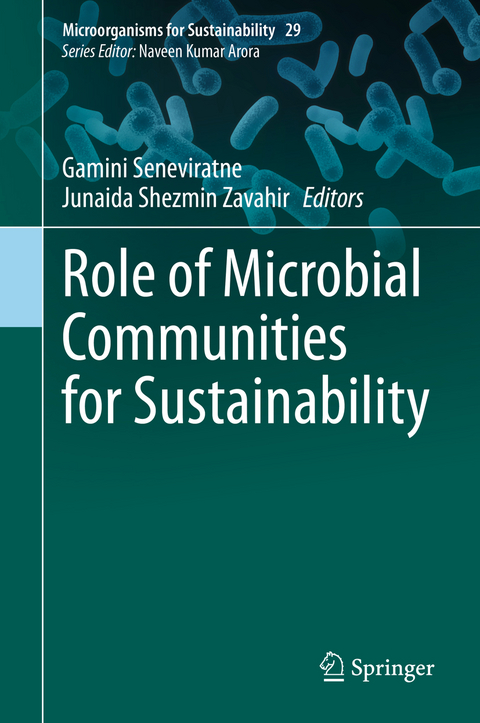
Role of Microbial Communities for Sustainability
Springer Verlag, Singapore
978-981-15-9911-8 (ISBN)
Gamini Seneviratne, Senior Research Professor, National Institute of Fundamental Studies, Hantana Road, Kandy, Sri Lanka J. Shezmin Zavahir, Teaching Associate & Analytical Chemistry Researcher, Monash University, Wellington Road, Clayton, VIC, Australia Professor Gamini Seneviratne Professor Seneviratne received his PhD from the University of Peradeniya, Sri Lanka, followed by postdoctoral fellowships in Katholieke Universiteit Leuven, Belgium, and the University of Sydney, Australia, where he is also a visiting professor. Currently, he is a senior research professor at the National Institute of Fundamental Studies (NIFS), Sri Lanka. He directs a novel field of research where microbial biofilms are developed for various biotechnological applications, including the world-first Biofilm-based biofertilizer biotechnology. He is a member of Soil Science Society of America, American Society for Microbiology, and a former editor, Agriculture, Ecosystems & Environment (Elsevier). He is a Fellow of the National Academy of Sciences in Sri Lanka. J. Shezmin Zavahir Junaida Shezmin Zavahir (J. S. Z. Ismail) received a BSc (Microbiology) and MSc (Biotechnology), from the Bangalore University, India. She is a PhD researcher in Analytical Chemistry at Monash University, Melbourne, Australia, and a Teaching Associate at its Faculty of Science. Her current research interests include gas chromatographic and infrared analysis of biofuels and essential oils, preceded by research on fungal-bacterial biofilm based biofertilizers. She has extensive experience as an analytical chemist of Alternate fuels. The recipient of numerous international and national awards, Shezmin is a member of the Chemicals and Plastics Innovation Network Industry Partnership, Australian Centre for Research on Separation Science and the Royal Australian Chemical Institute.
1 Role of Microbial Communities in Plant-Microbe Interactions, Metabolic Cooperation and Self-Sufficiency Leading to Sustainable Agriculture.- 2 Symbiotic Interactions of Phototrophic Microbes: Engineering Synthetic Consortia for Biotechnology.- 3 Understanding Agriculturally Indispensable Bacterial Biofilms in Sustainable Agriculture.- 4 Global Food Demand and The Roles of Microbial Communities in Sustainable Crop Protection and Food Security: An Overview.- 5 Sustaining Productivity through Integrated use of Microbes in Agriculture.- 6 Arbuscular Mycorrhizal Fungi for Sustainable Crop Protection and Production.- 7 Role of Microbial Communities in Sustainable Rice Cultivation.- 8 Applications of Soil Bacterial Community in Carbon Sequestration: An Accost towards Advanced Eco-Sustainability.- 9 Approach Towards Sustainable Crop Production by Utilizing Potential Microbiome.- 10 Diversity, Function and Application of Fungal Iron Chelators(Siderophores) for Integrated Disease Management.- 11 Role of Microbial Communities in the Low-Cost, Sustainable Treatment of Pig Effluent Waste.- 12 Metal Stress Impacting Plant Growth in Contaminated Soil is Alleviated by Microbial Siderophores.- 13 Natural and Constructed Cyanobacteria-based Consortia for Enhancing Crop Growth and Soil Fertility.- 14 Microbial Communities Based Biofilmed Biofertilizers Enhance Soil Fertility and Plant Growth in Hevea Ecosystem: Evidences from Seedlings and Immature Plants.
| Erscheinungsdatum | 05.02.2021 |
|---|---|
| Reihe/Serie | Microorganisms for Sustainability ; 29 |
| Zusatzinfo | 37 Illustrations, color; 8 Illustrations, black and white; XIII, 379 p. 45 illus., 37 illus. in color. |
| Verlagsort | Singapore |
| Sprache | englisch |
| Maße | 155 x 235 mm |
| Themenwelt | Naturwissenschaften ► Biologie ► Mikrobiologie / Immunologie |
| Naturwissenschaften ► Biologie ► Ökologie / Naturschutz | |
| Technik ► Umwelttechnik / Biotechnologie | |
| ISBN-10 | 981-15-9911-4 / 9811599114 |
| ISBN-13 | 978-981-15-9911-8 / 9789811599118 |
| Zustand | Neuware |
| Haben Sie eine Frage zum Produkt? |
aus dem Bereich


